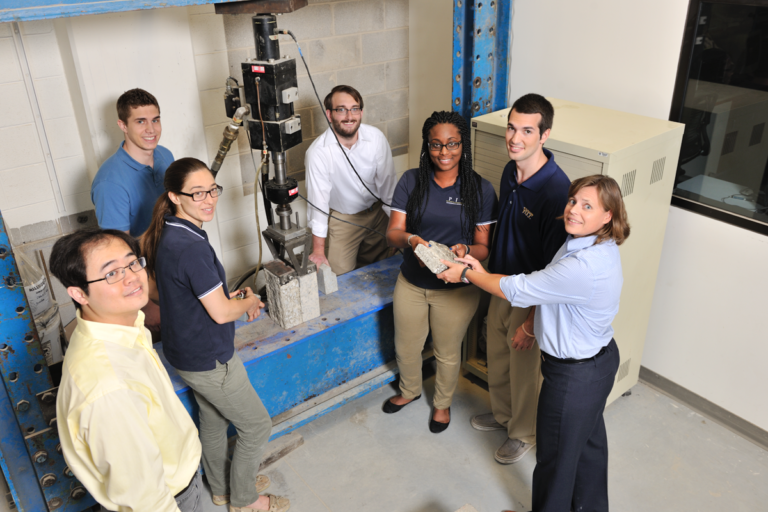
Civil and environmental engineering stands at the forefront of addressing some of the world’s most pressing issues. With increasing urbanisation, population growth and a changing climate, this field is more important than ever. According to the U.S. Bureau of Labor Statistics (BLS), the employment of civil engineers is projected to grow by 5% from 2022 to 2032.
As we move into the Green Industrial Revolution, the demand for engineers with advanced skills, knowledge and experience is set to grow even more. The best universities can help you prepare for this — like those profiled below:

The University of Pittsburgh is proud of its history and tradition in civil and environmental engineering education. Source: University of Pittsburgh
University of Pittsburgh
Programmes by the University of Pittsburgh’s Department of Civil and Environmental Engineering combine the best of theory and practice. What you learn here strikes the ideal balance between building a strong knowledge base and honing immediately translatable skills. An emphasis on experiential learning, where you engage in projects, internships, and research, ensures this. As a result, all Pitt CEE graduates land industry positions or progress to graduate school. Many go on to become leaders in this profession too, serving with government, private consulting firms and contractors as well as research in private industry and academic institutions.
If you seek to pursue the more advanced and sophisticated aspects of civil engineering, the MS in Civil Engineering is ideal for you. It offers eight speciality areas: Environmental Engineering, Structural Engineering, Water Resources Engineering, Geotechnical Engineering, Pavements Engineering, Transportation Engineering, Sustainable Engineering, Construction Management. The MS is offered on campus with some online options and is taught entirely by highly experienced practising professionals.
If you prefer a shorter, more flexible route to mastery, choose the department’s certificate programmes in Construction Management, Intelligent Construction (coming Fall 2024), and Environmental Exposomics (coming Fall 2024). Construction Management and Intelligent Construction are/will be available fully online. It’s designed to be a standalone graduate certificate as well as a pathway to earn an MS in Civil Engineering with 15 additional credits (five more classes)
The Intelligent Construction certificate stands out as a pioneering initiative. It will be the first programme to integrate Data Science, Machine Learning, Building Information Modeling, Digital Twin Technology, and Green Building Practices into a curriculum. Meanwhile, the Environmental Exposomics programme will uniquely bring together learning objectives in Environmental Engineering, Toxicology, and Public Health to prepare you to solve some of the most pressing issues at the nexus of water, air, industry, the environment, and human health. Discover how a Pitt CEE education can help you address societal needs brought about by climate change, population growth, and a greater focus on the environment.

Source: The College of Engineering consistently ranks among the top engineering schools in the nation and the world. Source: University of California, Berkeley Facebook
University of California, Berkeley
The College of Engineering at UC Berkeley is ranked among the top three engineering schools in the world. Dynamic, interdisciplinary and hands-on education — programmes here challenge conventional thinking and emphasise creativity and imagination. Most importantly, it’s a community of researchers, students and faculty members who are driven by social commitment and want to change the world.
At the Department of Civil and Environmental Engineering, one can find cutting-edge research to find engineering solutions for societal-scale challenges. This allows researchers to introduce new theories and improve understanding in an experiential manner, as well as provide students with the updated tools and techniques needed for solving current problems.
With some of the best laboratories for teaching and research in the US and a location in the San Francisco Bay Area, to study here is to have numerous exposure to engineering projects as well as professional opportunities.
One in every four undergrads in this department progresses to graduate school – making it one of the highest percentages in the College of Engineering. Others progress into a myriad of career opportunities, thanks to their skill set gained here to address the many pressing needs to improve and expand the infrastructure and protect the environment.

The Cockrell School of Engineering at The University of Texas at Austin is a top-10-ranked engineering school and the #1 engineering programme in Texas. Source: University of Texas at Austin Facebook
University of Texas at Austin
Ranked among the country’s biggest and best research universities, the University of Texas at Austin (UT Austin) is home to a sizable connected community of over 52,000 students and 3,000 teaching faculty. Here, the aim is to provide students with opportunities to participate in groundbreaking research while enjoying cutting-edge teaching and learning techniques.
Its Cockrell School of Engineering is a top-ranked engineering school with the #1 engineering programme in Texas. In fact, UT Austin has been a global leader in technology advancement and engineering education for over a century — as evidenced by its ability to produce four National Medals of Science and Technology winners and one Nobel Prize recipient.
The complex problems surrounding the nexus of cities, water, and energy demand that engineers have increased breadth and depth of knowledge. That’s where UT Austin’s graduate programmes in the Department of Civil, Architectural, and Environmental Engineering (CAEE) come in. They are known worldwide for developing students into leaders in engineering practice, research, and education. Here, students can pursue a Master of Science in Engineering degree in Civil Engineering and Environmental and Water Resources Engineering, whereas the PhD degree is offered only in Civil Engineering.
“It is an exciting time to be in Civil, Architectural and Environmental Engineering at UT Austin. What we do has become important and challenging as the world population grows in the face of expanded urbanisation, limited resources and changing climatic conditions,” says department chair Robert B. Gilbert. “We are leading major changes in energy, transportation, water management and treatment, sustainable construction and materials, and information technology.”
*Some of the institutions featured in this article are commercial partners of Study International









